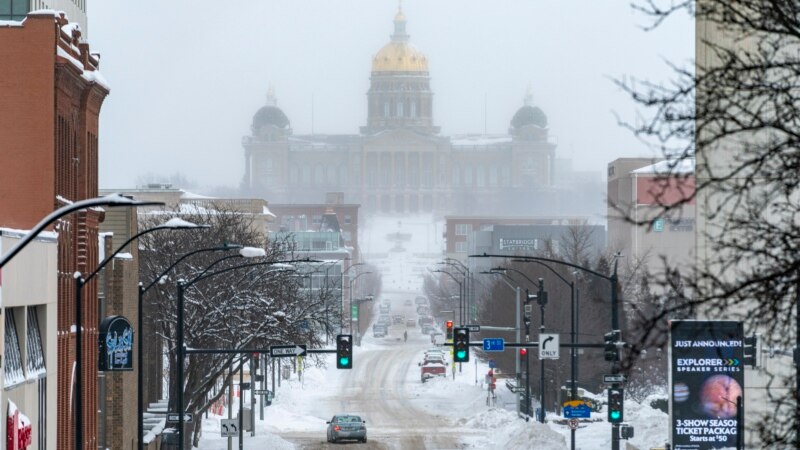
First it was the snow, then the bitter cold temperatures that iced out most of the campaign events in the U.S. Midwestern state of Iowa the weekend before the January 15 caucuses.
Former President Donald Trump, who has spent much of the week before the caucuses outside of the state, canceled most of his in-person events because of the weather.
Former United Nations Ambassador Nikki Haley moved many of her events online.
“It will make the non-passionate people stay home, and the passionate people will come out,” said Carson Odle, who was undeterred by the bad weather as he attended one of the few, in-person events that Florida Governor Ron DeSantis didn’t cancel, in the Des Moines suburb of Ankeny.
“The die-hards will come,” said Cheryl Weisheit, who also braved traveling in the snowstorm to hear DeSantis’ campaign pitch. “Early on it wasn’t that bad. … I don’t know … we’re just so used to this!”
Weisheit, who chairs a local Republican group, said physically attending an event was important to her because she still doesn’t know who to support on caucus night.
“I probably won’t know until that night,” she said.
Snow could affect turnout
Iowa Democrats shifted their presidential preference caucuses to mail-in balloting later in the election cycle, with incumbent President Joe Biden the likely winner.
So Republicans will take center stage during Iowa’s 2024 Caucuses, a first-in-the-nation event when supporters assemble in person to choose their candidate for the Republican nomination. It comes amid some of the heaviest snow and coldest temperatures Iowa has experienced during the caucuses in many years, creating several unknowns for how it will impact the results.
“The unknown here is how much the supporters for the various candidates will turn out,” said University of Iowa political science professor Tim Hagle. “Will the Trump supporters really be as loyal to him and as faithful to him as everyone expects?”
Hagle said if polling translates into turnout, it’s more difficult for the Republicans vying to unseat Trump as the front-runner and curbs their ability to pick up momentum as the race moves beyond Iowa.
“If Trump is still 30 points ahead or maybe even more, it seems pretty unlikely that DeSantis or Haley is going to be able to beat him or even come close because to a certain extent they are splitting the anti-Trump vote,” he said.
Hagle added that polling also shows Trump’s legal troubles haven’t dampened his support.
“Given that he was indicted in four different places, he’s got a civil trial going on in New York, he’s got a defamation trial going on there as well, states are trying to kick him off the ballot, all this means — in the eyes of a lot of his supporters — is that they’re politically persecuting him and so there’s a rally-around-the-chief effect that’s going on,” Hagle said.
Campaigns urge voters to show up
But there are signs of fatigue among Iowa voters. Retired police officer John Frank supported Trump before, but not this year.
“He’s getting up in age, just like Joe Biden, and we have to consider that,” Frank told VOA. “And he’s never learned in his life, especially his political life, to keep his mouth shut.”
Frank said he’ll caucus for DeSantis.
“Trump is probably going to win, but I don’t think it’s going to the be slam dunk people think,” said Weisheit, who has narrowed her choices to DeSantis and Haley, but not Trump.
“Well, if Trump is the candidate, I will [vote for him], but right now … he’s not the one that I will caucus for,” she said.
“You really have to energize your supporters and get them to turn out,” Hagle said, because “we often see some movement up until caucus night,” which is why the messaging from every candidate left in the race in the final days of the campaign is a push to encourage their supporters to physically show up to support them at caucus locations across the state on January 15.
